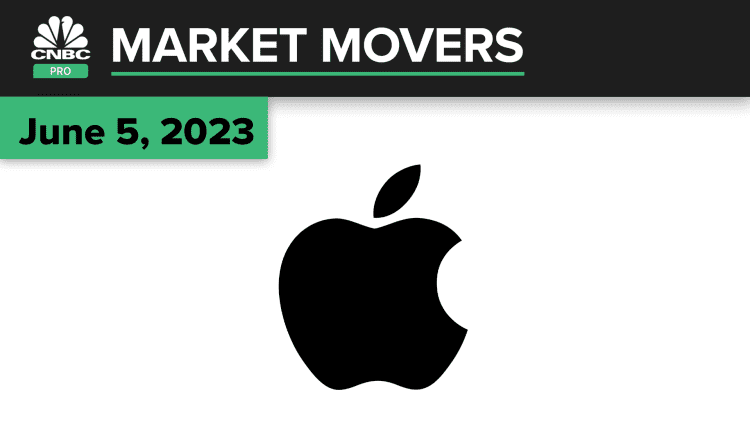
The S&P 500 finished lower on Monday, erasing earlier gains that brought the benchmark index to trade at its highest level on an intraday basis in nine months.
The S&P lost 0.2% to finish at 4,273.79, while the Nasdaq Composite dipped 0.09% to close at 13,229.43. The Dow Jones Industrial Average dropped 199.90 points, or 0.59%, to end at 33,562.86.
Apple lost about 0.8%, retreating from all-time highs touched earlier in the session. The iPhone maker on Monday unveiled its highly anticipated virtual reality headset and a slew of software updates at its annual Worldwide Developers Conference.
Intel shed 4.6% as Apple revealed a new chip, while Nvidia pulled back on valuation concerns after its recent surge. JPMorgan Chase and Goldman Sachs struggled amid news that regulators are considering upping capital requirements at large banks.
Markets are "catching their breath after Friday's broad-based rally," said Ryan Detrick, chief market strategist at the Carson Group. "It's a very lackluster news day, which isn't a bad thing as we consolidate some of those big recent gains we've had."
Stocks rallied last week as Friday's May jobs report signaled to some investors that the long-anticipated recession may no longer be in the cards for the economy — or at least pushed off until 2024. The passage of the debt ceiling bill also boosted investor sentiment.
"What the market is doing ... I think is appropriate, but there are things that we don't know yet and the big issue is the Fed," Mohamed El-Erian told CNBC's "Squawk Box" on Monday.
The Allianz chief economic advisor noted that while major debt and banking fears have dissipated, what comes next hinges on the Federal Reserve's target for bringing down inflation. Markets would appear fairly priced if the central bank "acknowledges that 2% is the wrong target," he said.
Despite recent moves, worries persist over 2023's narrow stock market rally, led by just a handful of tech names, and whether there could be an intermediate-term correction if breadth fails to improve.
"We think as long as the economy continues to chug along and doesn't show any signs of recession —which so far it hasn't — the rest of the market can play catch up, and we'll see some of those other sectors close the gap a little bit," said Chris Zaccarelli, chief investment officer at Independent Advisor Alliance.


